EDUC 5040: Identity and Social Location - A Reflective Analysis
VerifiedAdded on 2023/04/21
|10
|3050
|470
Essay
AI Summary
This essay reflects on the author's social location and identity, particularly focusing on the influence of Punjabi culture in India and the subsequent cultural and social changes experienced upon moving to Canada. It delves into traditions, beliefs, and ethnic relations in Punjab, highlighting issues such as gender discrimination, superstitions, and the complexities of the reservation system. The essay further explores the author's Sikhism religion and organizational culture in Punjab, contrasting it with the Canadian culture emphasizing independence, respect, and a corruption-free work environment. The reflective narrative encompasses personal experiences and observations, providing insights into the challenges and adaptations encountered during this cross-cultural transition. Desklib offers a platform to access this and similar assignments.
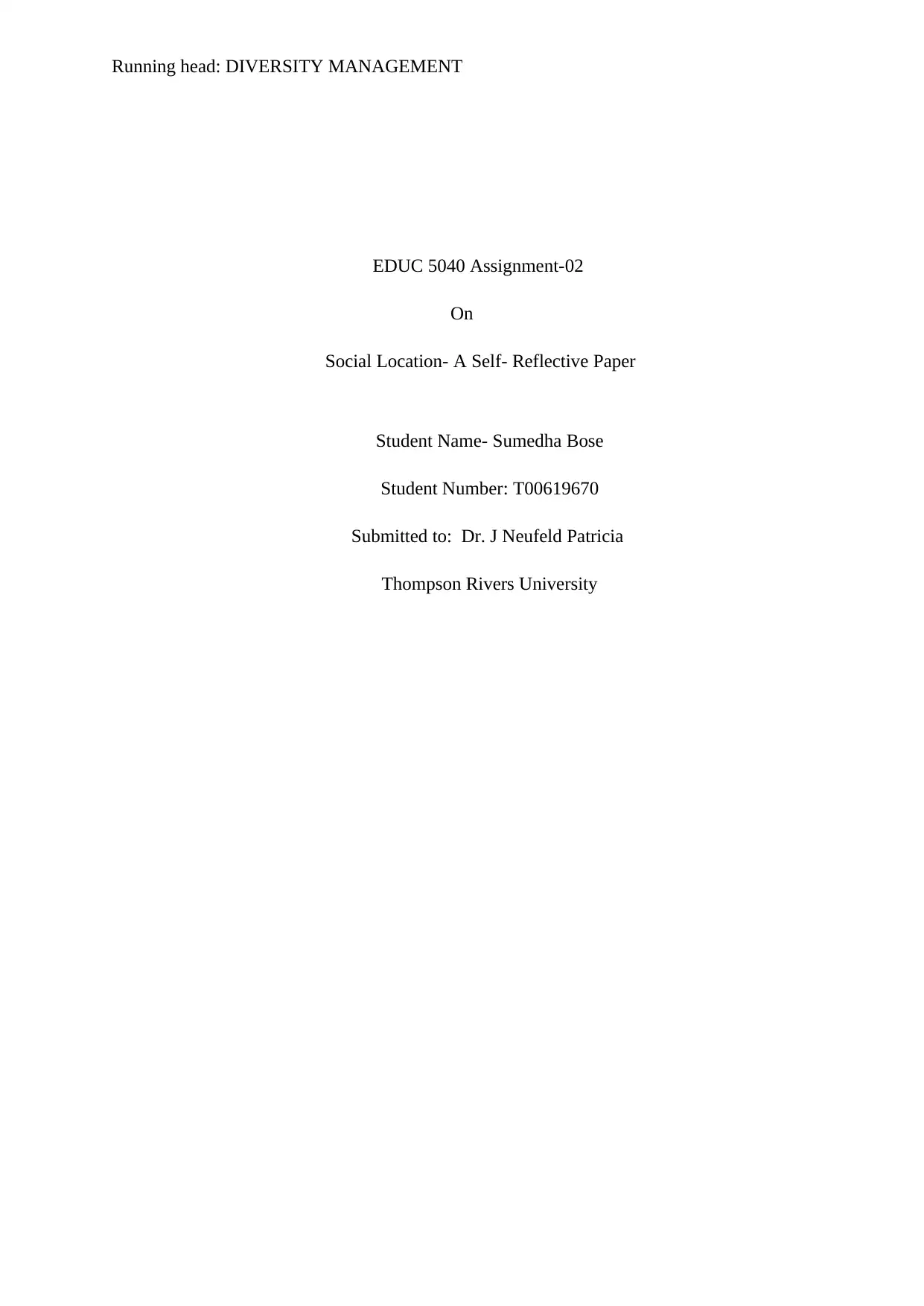
Running head: DIVERSITY MANAGEMENT
EDUC 5040 Assignment-02
On
Social Location- A Self- Reflective Paper
Student Name- Sumedha Bose
Student Number: T00619670
Submitted to: Dr. J Neufeld Patricia
Thompson Rivers University
EDUC 5040 Assignment-02
On
Social Location- A Self- Reflective Paper
Student Name- Sumedha Bose
Student Number: T00619670
Submitted to: Dr. J Neufeld Patricia
Thompson Rivers University
Paraphrase This Document
Need a fresh take? Get an instant paraphrase of this document with our AI Paraphraser
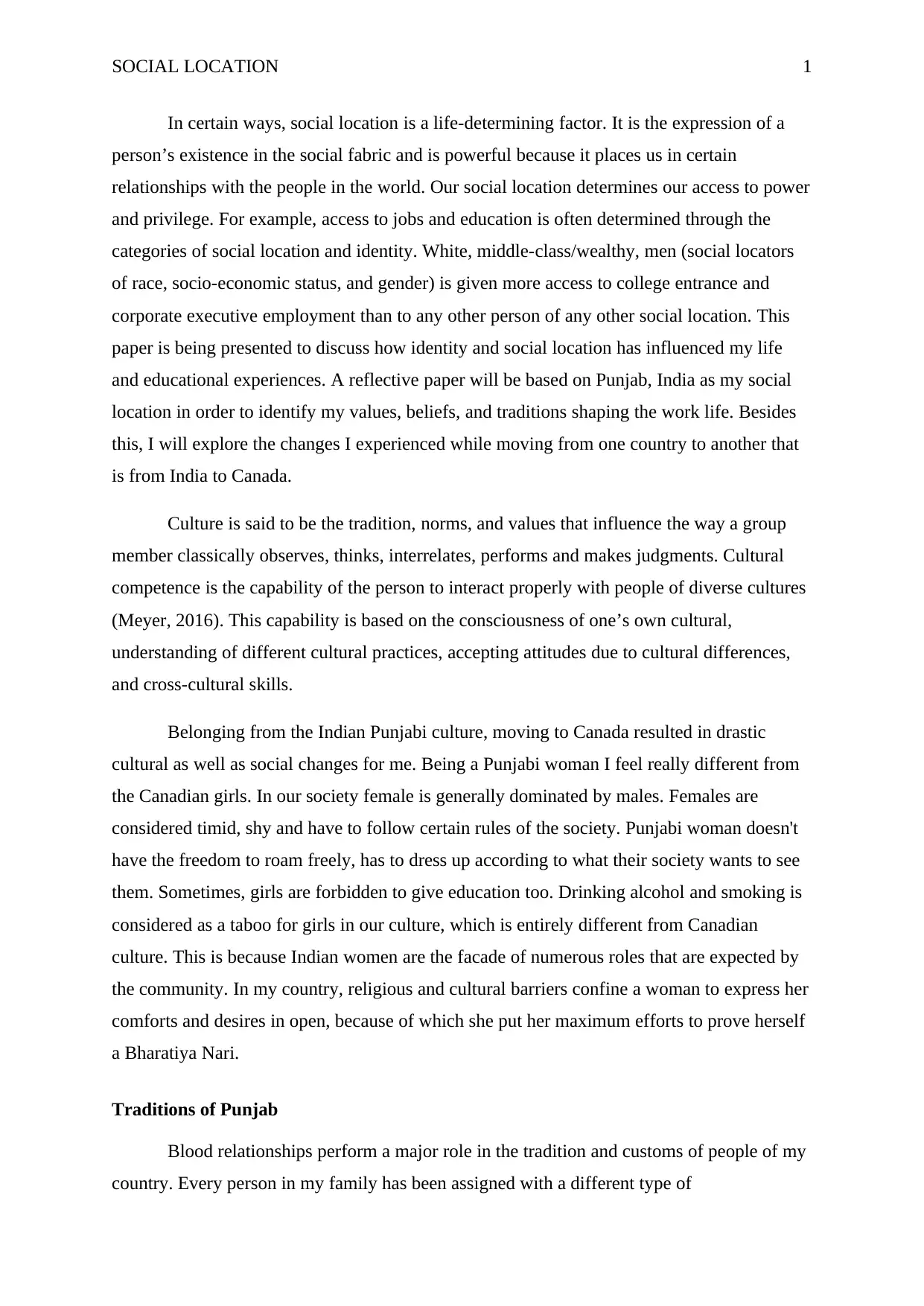
SOCIAL LOCATION 1
In certain ways, social location is a life-determining factor. It is the expression of a
person’s existence in the social fabric and is powerful because it places us in certain
relationships with the people in the world. Our social location determines our access to power
and privilege. For example, access to jobs and education is often determined through the
categories of social location and identity. White, middle-class/wealthy, men (social locators
of race, socio-economic status, and gender) is given more access to college entrance and
corporate executive employment than to any other person of any other social location. This
paper is being presented to discuss how identity and social location has influenced my life
and educational experiences. A reflective paper will be based on Punjab, India as my social
location in order to identify my values, beliefs, and traditions shaping the work life. Besides
this, I will explore the changes I experienced while moving from one country to another that
is from India to Canada.
Culture is said to be the tradition, norms, and values that influence the way a group
member classically observes, thinks, interrelates, performs and makes judgments. Cultural
competence is the capability of the person to interact properly with people of diverse cultures
(Meyer, 2016). This capability is based on the consciousness of one’s own cultural,
understanding of different cultural practices, accepting attitudes due to cultural differences,
and cross-cultural skills.
Belonging from the Indian Punjabi culture, moving to Canada resulted in drastic
cultural as well as social changes for me. Being a Punjabi woman I feel really different from
the Canadian girls. In our society female is generally dominated by males. Females are
considered timid, shy and have to follow certain rules of the society. Punjabi woman doesn't
have the freedom to roam freely, has to dress up according to what their society wants to see
them. Sometimes, girls are forbidden to give education too. Drinking alcohol and smoking is
considered as a taboo for girls in our culture, which is entirely different from Canadian
culture. This is because Indian women are the facade of numerous roles that are expected by
the community. In my country, religious and cultural barriers confine a woman to express her
comforts and desires in open, because of which she put her maximum efforts to prove herself
a Bharatiya Nari.
Traditions of Punjab
Blood relationships perform a major role in the tradition and customs of people of my
country. Every person in my family has been assigned with a different type of
In certain ways, social location is a life-determining factor. It is the expression of a
person’s existence in the social fabric and is powerful because it places us in certain
relationships with the people in the world. Our social location determines our access to power
and privilege. For example, access to jobs and education is often determined through the
categories of social location and identity. White, middle-class/wealthy, men (social locators
of race, socio-economic status, and gender) is given more access to college entrance and
corporate executive employment than to any other person of any other social location. This
paper is being presented to discuss how identity and social location has influenced my life
and educational experiences. A reflective paper will be based on Punjab, India as my social
location in order to identify my values, beliefs, and traditions shaping the work life. Besides
this, I will explore the changes I experienced while moving from one country to another that
is from India to Canada.
Culture is said to be the tradition, norms, and values that influence the way a group
member classically observes, thinks, interrelates, performs and makes judgments. Cultural
competence is the capability of the person to interact properly with people of diverse cultures
(Meyer, 2016). This capability is based on the consciousness of one’s own cultural,
understanding of different cultural practices, accepting attitudes due to cultural differences,
and cross-cultural skills.
Belonging from the Indian Punjabi culture, moving to Canada resulted in drastic
cultural as well as social changes for me. Being a Punjabi woman I feel really different from
the Canadian girls. In our society female is generally dominated by males. Females are
considered timid, shy and have to follow certain rules of the society. Punjabi woman doesn't
have the freedom to roam freely, has to dress up according to what their society wants to see
them. Sometimes, girls are forbidden to give education too. Drinking alcohol and smoking is
considered as a taboo for girls in our culture, which is entirely different from Canadian
culture. This is because Indian women are the facade of numerous roles that are expected by
the community. In my country, religious and cultural barriers confine a woman to express her
comforts and desires in open, because of which she put her maximum efforts to prove herself
a Bharatiya Nari.
Traditions of Punjab
Blood relationships perform a major role in the tradition and customs of people of my
country. Every person in my family has been assigned with a different type of
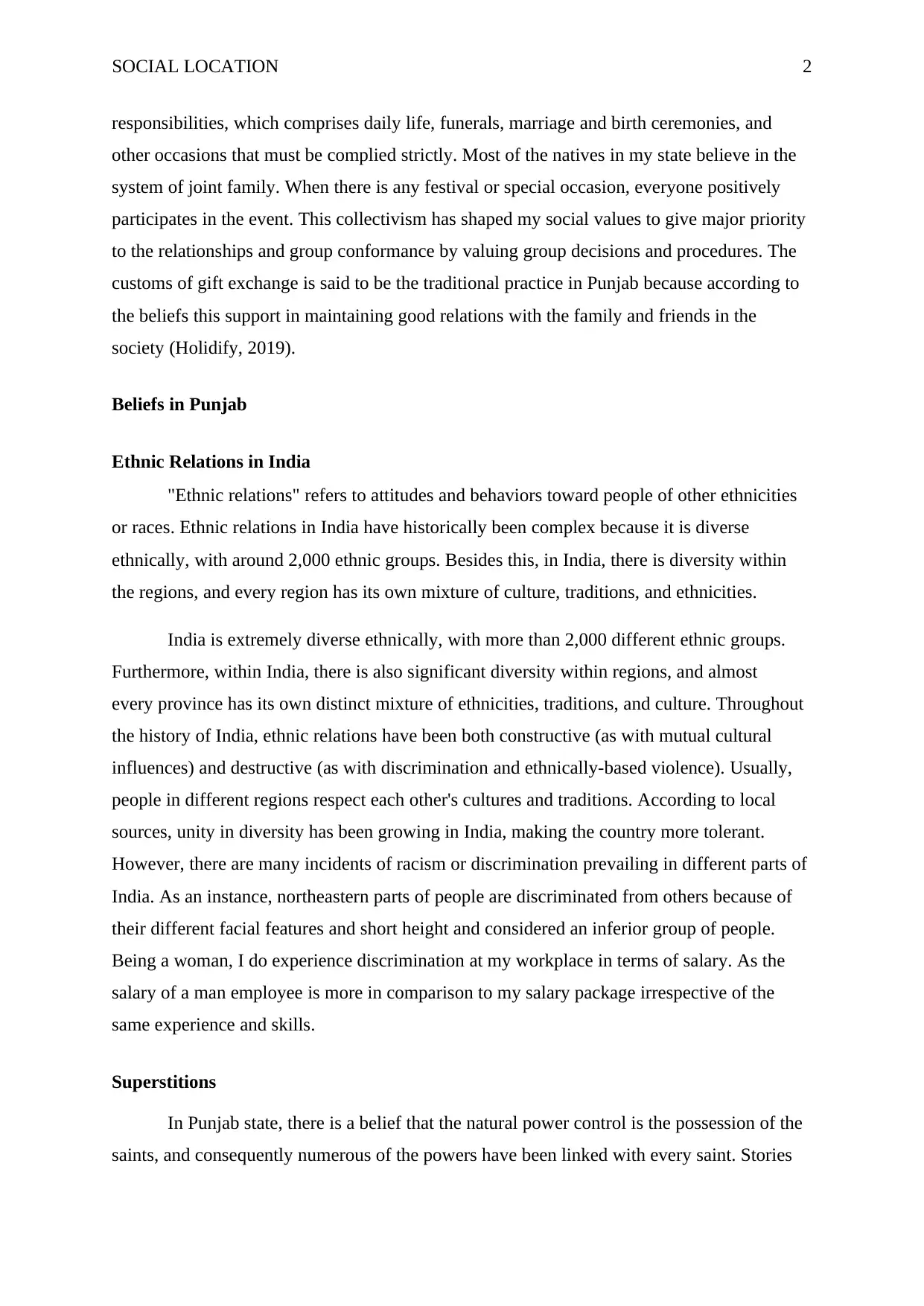
SOCIAL LOCATION 2
responsibilities, which comprises daily life, funerals, marriage and birth ceremonies, and
other occasions that must be complied strictly. Most of the natives in my state believe in the
system of joint family. When there is any festival or special occasion, everyone positively
participates in the event. This collectivism has shaped my social values to give major priority
to the relationships and group conformance by valuing group decisions and procedures. The
customs of gift exchange is said to be the traditional practice in Punjab because according to
the beliefs this support in maintaining good relations with the family and friends in the
society (Holidify, 2019).
Beliefs in Punjab
Ethnic Relations in India
"Ethnic relations" refers to attitudes and behaviors toward people of other ethnicities
or races. Ethnic relations in India have historically been complex because it is diverse
ethnically, with around 2,000 ethnic groups. Besides this, in India, there is diversity within
the regions, and every region has its own mixture of culture, traditions, and ethnicities.
India is extremely diverse ethnically, with more than 2,000 different ethnic groups.
Furthermore, within India, there is also significant diversity within regions, and almost
every province has its own distinct mixture of ethnicities, traditions, and culture. Throughout
the history of India, ethnic relations have been both constructive (as with mutual cultural
influences) and destructive (as with discrimination and ethnically-based violence). Usually,
people in different regions respect each other's cultures and traditions. According to local
sources, unity in diversity has been growing in India, making the country more tolerant.
However, there are many incidents of racism or discrimination prevailing in different parts of
India. As an instance, northeastern parts of people are discriminated from others because of
their different facial features and short height and considered an inferior group of people.
Being a woman, I do experience discrimination at my workplace in terms of salary. As the
salary of a man employee is more in comparison to my salary package irrespective of the
same experience and skills.
Superstitions
In Punjab state, there is a belief that the natural power control is the possession of the
saints, and consequently numerous of the powers have been linked with every saint. Stories
responsibilities, which comprises daily life, funerals, marriage and birth ceremonies, and
other occasions that must be complied strictly. Most of the natives in my state believe in the
system of joint family. When there is any festival or special occasion, everyone positively
participates in the event. This collectivism has shaped my social values to give major priority
to the relationships and group conformance by valuing group decisions and procedures. The
customs of gift exchange is said to be the traditional practice in Punjab because according to
the beliefs this support in maintaining good relations with the family and friends in the
society (Holidify, 2019).
Beliefs in Punjab
Ethnic Relations in India
"Ethnic relations" refers to attitudes and behaviors toward people of other ethnicities
or races. Ethnic relations in India have historically been complex because it is diverse
ethnically, with around 2,000 ethnic groups. Besides this, in India, there is diversity within
the regions, and every region has its own mixture of culture, traditions, and ethnicities.
India is extremely diverse ethnically, with more than 2,000 different ethnic groups.
Furthermore, within India, there is also significant diversity within regions, and almost
every province has its own distinct mixture of ethnicities, traditions, and culture. Throughout
the history of India, ethnic relations have been both constructive (as with mutual cultural
influences) and destructive (as with discrimination and ethnically-based violence). Usually,
people in different regions respect each other's cultures and traditions. According to local
sources, unity in diversity has been growing in India, making the country more tolerant.
However, there are many incidents of racism or discrimination prevailing in different parts of
India. As an instance, northeastern parts of people are discriminated from others because of
their different facial features and short height and considered an inferior group of people.
Being a woman, I do experience discrimination at my workplace in terms of salary. As the
salary of a man employee is more in comparison to my salary package irrespective of the
same experience and skills.
Superstitions
In Punjab state, there is a belief that the natural power control is the possession of the
saints, and consequently numerous of the powers have been linked with every saint. Stories
⊘ This is a preview!⊘
Do you want full access?
Subscribe today to unlock all pages.

Trusted by 1+ million students worldwide
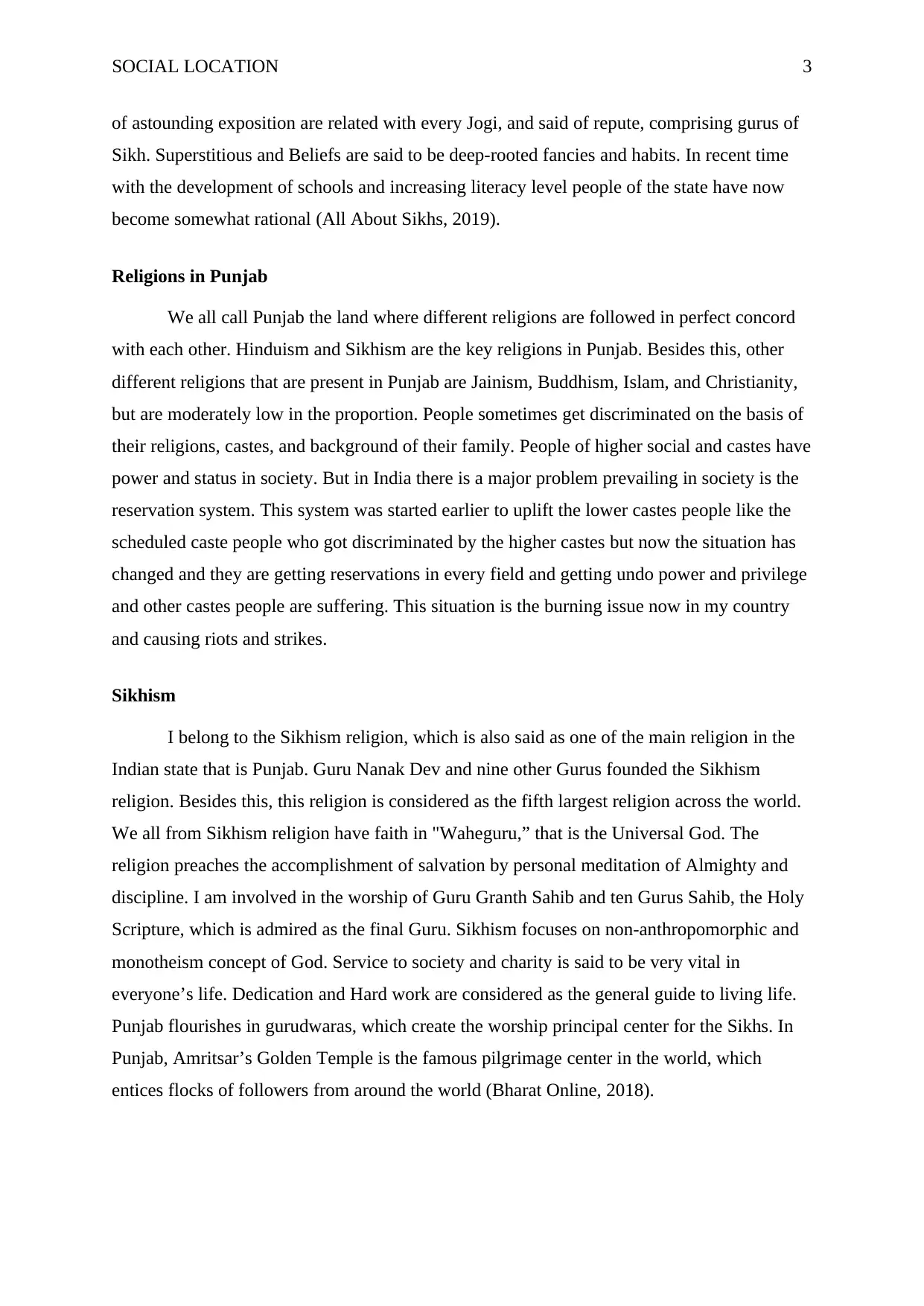
SOCIAL LOCATION 3
of astounding exposition are related with every Jogi, and said of repute, comprising gurus of
Sikh. Superstitious and Beliefs are said to be deep-rooted fancies and habits. In recent time
with the development of schools and increasing literacy level people of the state have now
become somewhat rational (All About Sikhs, 2019).
Religions in Punjab
We all call Punjab the land where different religions are followed in perfect concord
with each other. Hinduism and Sikhism are the key religions in Punjab. Besides this, other
different religions that are present in Punjab are Jainism, Buddhism, Islam, and Christianity,
but are moderately low in the proportion. People sometimes get discriminated on the basis of
their religions, castes, and background of their family. People of higher social and castes have
power and status in society. But in India there is a major problem prevailing in society is the
reservation system. This system was started earlier to uplift the lower castes people like the
scheduled caste people who got discriminated by the higher castes but now the situation has
changed and they are getting reservations in every field and getting undo power and privilege
and other castes people are suffering. This situation is the burning issue now in my country
and causing riots and strikes.
Sikhism
I belong to the Sikhism religion, which is also said as one of the main religion in the
Indian state that is Punjab. Guru Nanak Dev and nine other Gurus founded the Sikhism
religion. Besides this, this religion is considered as the fifth largest religion across the world.
We all from Sikhism religion have faith in "Waheguru,” that is the Universal God. The
religion preaches the accomplishment of salvation by personal meditation of Almighty and
discipline. I am involved in the worship of Guru Granth Sahib and ten Gurus Sahib, the Holy
Scripture, which is admired as the final Guru. Sikhism focuses on non-anthropomorphic and
monotheism concept of God. Service to society and charity is said to be very vital in
everyone’s life. Dedication and Hard work are considered as the general guide to living life.
Punjab flourishes in gurudwaras, which create the worship principal center for the Sikhs. In
Punjab, Amritsar’s Golden Temple is the famous pilgrimage center in the world, which
entices flocks of followers from around the world (Bharat Online, 2018).
of astounding exposition are related with every Jogi, and said of repute, comprising gurus of
Sikh. Superstitious and Beliefs are said to be deep-rooted fancies and habits. In recent time
with the development of schools and increasing literacy level people of the state have now
become somewhat rational (All About Sikhs, 2019).
Religions in Punjab
We all call Punjab the land where different religions are followed in perfect concord
with each other. Hinduism and Sikhism are the key religions in Punjab. Besides this, other
different religions that are present in Punjab are Jainism, Buddhism, Islam, and Christianity,
but are moderately low in the proportion. People sometimes get discriminated on the basis of
their religions, castes, and background of their family. People of higher social and castes have
power and status in society. But in India there is a major problem prevailing in society is the
reservation system. This system was started earlier to uplift the lower castes people like the
scheduled caste people who got discriminated by the higher castes but now the situation has
changed and they are getting reservations in every field and getting undo power and privilege
and other castes people are suffering. This situation is the burning issue now in my country
and causing riots and strikes.
Sikhism
I belong to the Sikhism religion, which is also said as one of the main religion in the
Indian state that is Punjab. Guru Nanak Dev and nine other Gurus founded the Sikhism
religion. Besides this, this religion is considered as the fifth largest religion across the world.
We all from Sikhism religion have faith in "Waheguru,” that is the Universal God. The
religion preaches the accomplishment of salvation by personal meditation of Almighty and
discipline. I am involved in the worship of Guru Granth Sahib and ten Gurus Sahib, the Holy
Scripture, which is admired as the final Guru. Sikhism focuses on non-anthropomorphic and
monotheism concept of God. Service to society and charity is said to be very vital in
everyone’s life. Dedication and Hard work are considered as the general guide to living life.
Punjab flourishes in gurudwaras, which create the worship principal center for the Sikhs. In
Punjab, Amritsar’s Golden Temple is the famous pilgrimage center in the world, which
entices flocks of followers from around the world (Bharat Online, 2018).
Paraphrase This Document
Need a fresh take? Get an instant paraphrase of this document with our AI Paraphraser
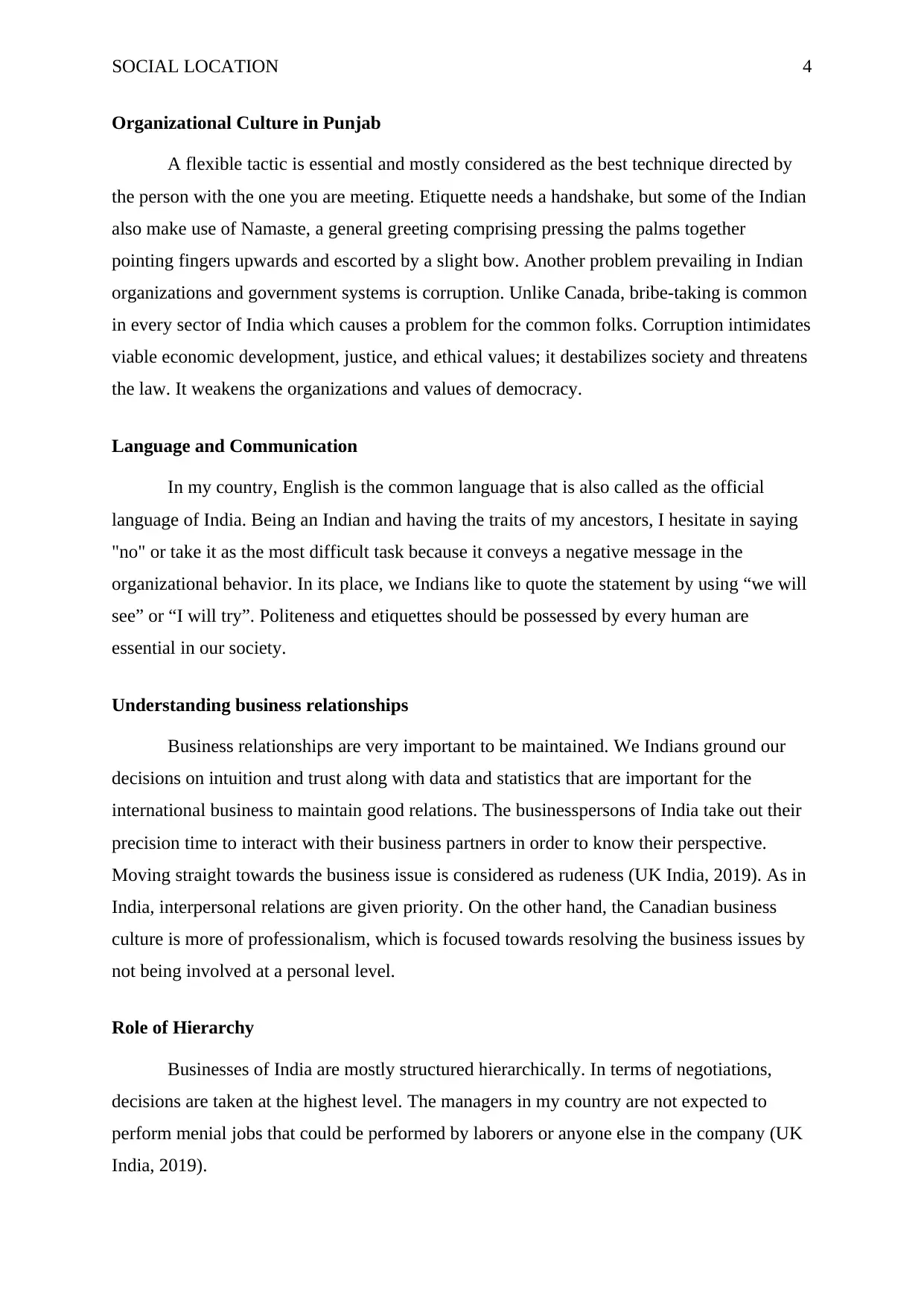
SOCIAL LOCATION 4
Organizational Culture in Punjab
A flexible tactic is essential and mostly considered as the best technique directed by
the person with the one you are meeting. Etiquette needs a handshake, but some of the Indian
also make use of Namaste, a general greeting comprising pressing the palms together
pointing fingers upwards and escorted by a slight bow. Another problem prevailing in Indian
organizations and government systems is corruption. Unlike Canada, bribe-taking is common
in every sector of India which causes a problem for the common folks. Corruption intimidates
viable economic development, justice, and ethical values; it destabilizes society and threatens
the law. It weakens the organizations and values of democracy.
Language and Communication
In my country, English is the common language that is also called as the official
language of India. Being an Indian and having the traits of my ancestors, I hesitate in saying
"no" or take it as the most difficult task because it conveys a negative message in the
organizational behavior. In its place, we Indians like to quote the statement by using “we will
see” or “I will try”. Politeness and etiquettes should be possessed by every human are
essential in our society.
Understanding business relationships
Business relationships are very important to be maintained. We Indians ground our
decisions on intuition and trust along with data and statistics that are important for the
international business to maintain good relations. The businesspersons of India take out their
precision time to interact with their business partners in order to know their perspective.
Moving straight towards the business issue is considered as rudeness (UK India, 2019). As in
India, interpersonal relations are given priority. On the other hand, the Canadian business
culture is more of professionalism, which is focused towards resolving the business issues by
not being involved at a personal level.
Role of Hierarchy
Businesses of India are mostly structured hierarchically. In terms of negotiations,
decisions are taken at the highest level. The managers in my country are not expected to
perform menial jobs that could be performed by laborers or anyone else in the company (UK
India, 2019).
Organizational Culture in Punjab
A flexible tactic is essential and mostly considered as the best technique directed by
the person with the one you are meeting. Etiquette needs a handshake, but some of the Indian
also make use of Namaste, a general greeting comprising pressing the palms together
pointing fingers upwards and escorted by a slight bow. Another problem prevailing in Indian
organizations and government systems is corruption. Unlike Canada, bribe-taking is common
in every sector of India which causes a problem for the common folks. Corruption intimidates
viable economic development, justice, and ethical values; it destabilizes society and threatens
the law. It weakens the organizations and values of democracy.
Language and Communication
In my country, English is the common language that is also called as the official
language of India. Being an Indian and having the traits of my ancestors, I hesitate in saying
"no" or take it as the most difficult task because it conveys a negative message in the
organizational behavior. In its place, we Indians like to quote the statement by using “we will
see” or “I will try”. Politeness and etiquettes should be possessed by every human are
essential in our society.
Understanding business relationships
Business relationships are very important to be maintained. We Indians ground our
decisions on intuition and trust along with data and statistics that are important for the
international business to maintain good relations. The businesspersons of India take out their
precision time to interact with their business partners in order to know their perspective.
Moving straight towards the business issue is considered as rudeness (UK India, 2019). As in
India, interpersonal relations are given priority. On the other hand, the Canadian business
culture is more of professionalism, which is focused towards resolving the business issues by
not being involved at a personal level.
Role of Hierarchy
Businesses of India are mostly structured hierarchically. In terms of negotiations,
decisions are taken at the highest level. The managers in my country are not expected to
perform menial jobs that could be performed by laborers or anyone else in the company (UK
India, 2019).
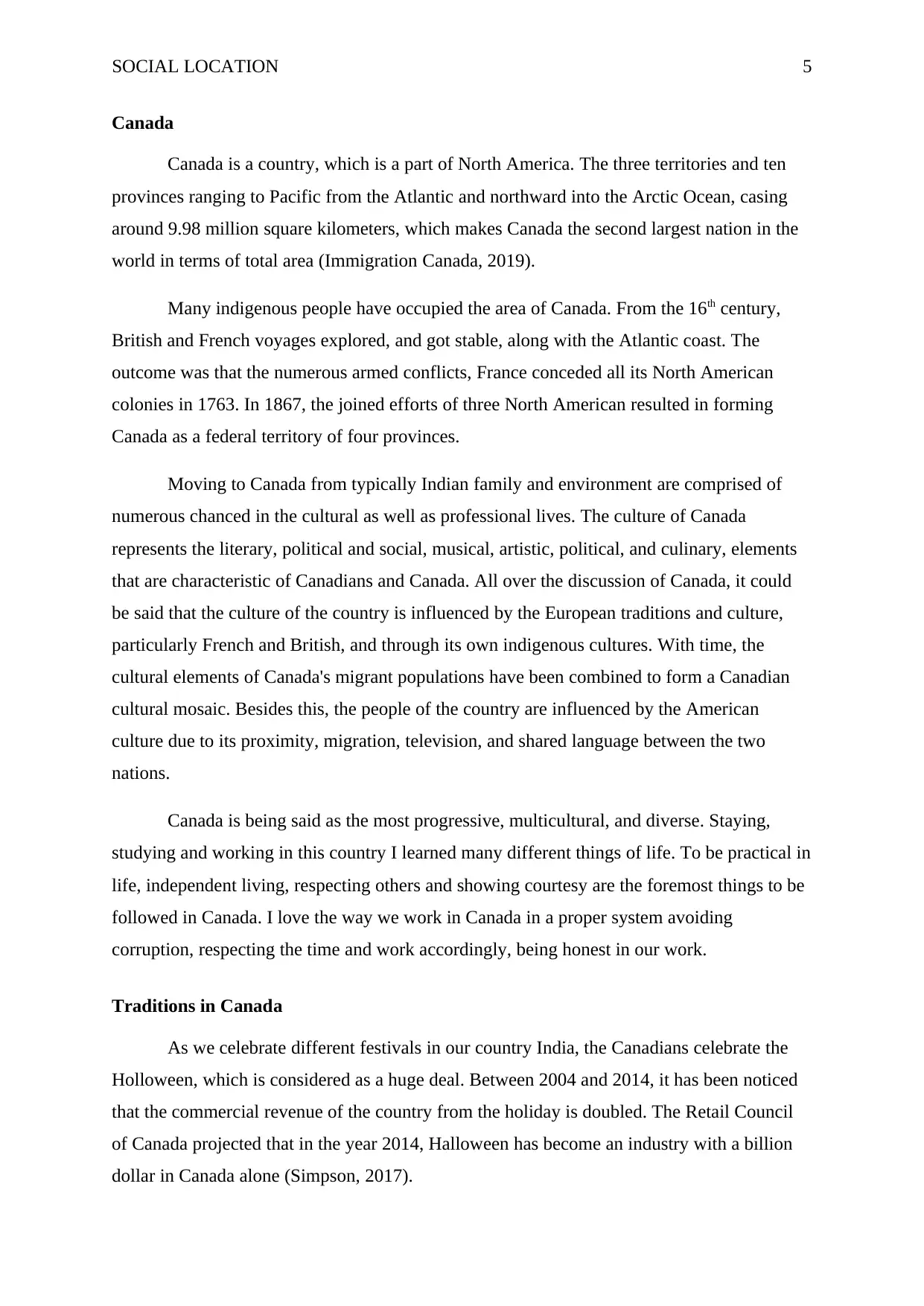
SOCIAL LOCATION 5
Canada
Canada is a country, which is a part of North America. The three territories and ten
provinces ranging to Pacific from the Atlantic and northward into the Arctic Ocean, casing
around 9.98 million square kilometers, which makes Canada the second largest nation in the
world in terms of total area (Immigration Canada, 2019).
Many indigenous people have occupied the area of Canada. From the 16th century,
British and French voyages explored, and got stable, along with the Atlantic coast. The
outcome was that the numerous armed conflicts, France conceded all its North American
colonies in 1763. In 1867, the joined efforts of three North American resulted in forming
Canada as a federal territory of four provinces.
Moving to Canada from typically Indian family and environment are comprised of
numerous chanced in the cultural as well as professional lives. The culture of Canada
represents the literary, political and social, musical, artistic, political, and culinary, elements
that are characteristic of Canadians and Canada. All over the discussion of Canada, it could
be said that the culture of the country is influenced by the European traditions and culture,
particularly French and British, and through its own indigenous cultures. With time, the
cultural elements of Canada's migrant populations have been combined to form a Canadian
cultural mosaic. Besides this, the people of the country are influenced by the American
culture due to its proximity, migration, television, and shared language between the two
nations.
Canada is being said as the most progressive, multicultural, and diverse. Staying,
studying and working in this country I learned many different things of life. To be practical in
life, independent living, respecting others and showing courtesy are the foremost things to be
followed in Canada. I love the way we work in Canada in a proper system avoiding
corruption, respecting the time and work accordingly, being honest in our work.
Traditions in Canada
As we celebrate different festivals in our country India, the Canadians celebrate the
Holloween, which is considered as a huge deal. Between 2004 and 2014, it has been noticed
that the commercial revenue of the country from the holiday is doubled. The Retail Council
of Canada projected that in the year 2014, Halloween has become an industry with a billion
dollar in Canada alone (Simpson, 2017).
Canada
Canada is a country, which is a part of North America. The three territories and ten
provinces ranging to Pacific from the Atlantic and northward into the Arctic Ocean, casing
around 9.98 million square kilometers, which makes Canada the second largest nation in the
world in terms of total area (Immigration Canada, 2019).
Many indigenous people have occupied the area of Canada. From the 16th century,
British and French voyages explored, and got stable, along with the Atlantic coast. The
outcome was that the numerous armed conflicts, France conceded all its North American
colonies in 1763. In 1867, the joined efforts of three North American resulted in forming
Canada as a federal territory of four provinces.
Moving to Canada from typically Indian family and environment are comprised of
numerous chanced in the cultural as well as professional lives. The culture of Canada
represents the literary, political and social, musical, artistic, political, and culinary, elements
that are characteristic of Canadians and Canada. All over the discussion of Canada, it could
be said that the culture of the country is influenced by the European traditions and culture,
particularly French and British, and through its own indigenous cultures. With time, the
cultural elements of Canada's migrant populations have been combined to form a Canadian
cultural mosaic. Besides this, the people of the country are influenced by the American
culture due to its proximity, migration, television, and shared language between the two
nations.
Canada is being said as the most progressive, multicultural, and diverse. Staying,
studying and working in this country I learned many different things of life. To be practical in
life, independent living, respecting others and showing courtesy are the foremost things to be
followed in Canada. I love the way we work in Canada in a proper system avoiding
corruption, respecting the time and work accordingly, being honest in our work.
Traditions in Canada
As we celebrate different festivals in our country India, the Canadians celebrate the
Holloween, which is considered as a huge deal. Between 2004 and 2014, it has been noticed
that the commercial revenue of the country from the holiday is doubled. The Retail Council
of Canada projected that in the year 2014, Halloween has become an industry with a billion
dollar in Canada alone (Simpson, 2017).
⊘ This is a preview!⊘
Do you want full access?
Subscribe today to unlock all pages.

Trusted by 1+ million students worldwide
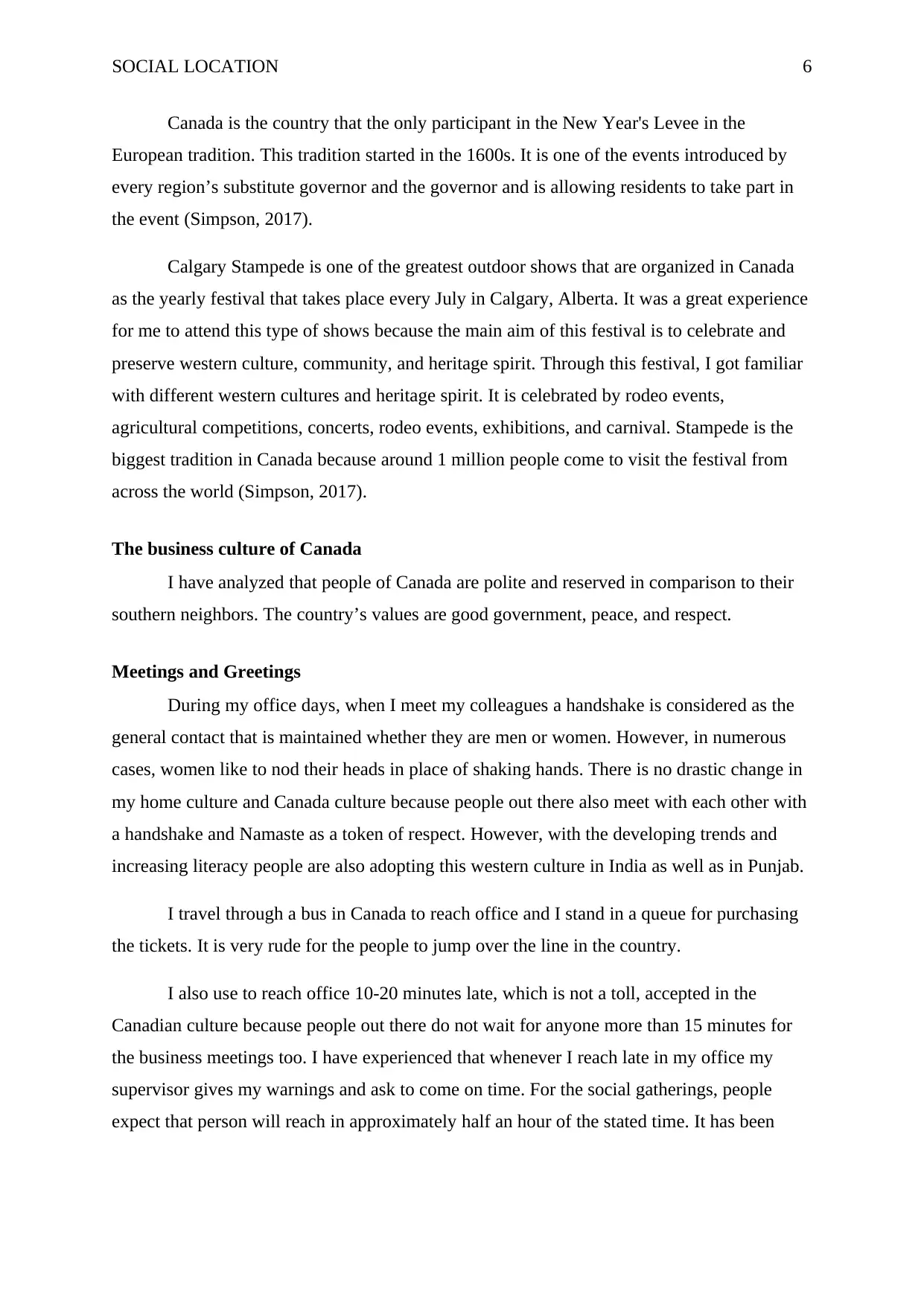
SOCIAL LOCATION 6
Canada is the country that the only participant in the New Year's Levee in the
European tradition. This tradition started in the 1600s. It is one of the events introduced by
every region’s substitute governor and the governor and is allowing residents to take part in
the event (Simpson, 2017).
Calgary Stampede is one of the greatest outdoor shows that are organized in Canada
as the yearly festival that takes place every July in Calgary, Alberta. It was a great experience
for me to attend this type of shows because the main aim of this festival is to celebrate and
preserve western culture, community, and heritage spirit. Through this festival, I got familiar
with different western cultures and heritage spirit. It is celebrated by rodeo events,
agricultural competitions, concerts, rodeo events, exhibitions, and carnival. Stampede is the
biggest tradition in Canada because around 1 million people come to visit the festival from
across the world (Simpson, 2017).
The business culture of Canada
I have analyzed that people of Canada are polite and reserved in comparison to their
southern neighbors. The country’s values are good government, peace, and respect.
Meetings and Greetings
During my office days, when I meet my colleagues a handshake is considered as the
general contact that is maintained whether they are men or women. However, in numerous
cases, women like to nod their heads in place of shaking hands. There is no drastic change in
my home culture and Canada culture because people out there also meet with each other with
a handshake and Namaste as a token of respect. However, with the developing trends and
increasing literacy people are also adopting this western culture in India as well as in Punjab.
I travel through a bus in Canada to reach office and I stand in a queue for purchasing
the tickets. It is very rude for the people to jump over the line in the country.
I also use to reach office 10-20 minutes late, which is not a toll, accepted in the
Canadian culture because people out there do not wait for anyone more than 15 minutes for
the business meetings too. I have experienced that whenever I reach late in my office my
supervisor gives my warnings and ask to come on time. For the social gatherings, people
expect that person will reach in approximately half an hour of the stated time. It has been
Canada is the country that the only participant in the New Year's Levee in the
European tradition. This tradition started in the 1600s. It is one of the events introduced by
every region’s substitute governor and the governor and is allowing residents to take part in
the event (Simpson, 2017).
Calgary Stampede is one of the greatest outdoor shows that are organized in Canada
as the yearly festival that takes place every July in Calgary, Alberta. It was a great experience
for me to attend this type of shows because the main aim of this festival is to celebrate and
preserve western culture, community, and heritage spirit. Through this festival, I got familiar
with different western cultures and heritage spirit. It is celebrated by rodeo events,
agricultural competitions, concerts, rodeo events, exhibitions, and carnival. Stampede is the
biggest tradition in Canada because around 1 million people come to visit the festival from
across the world (Simpson, 2017).
The business culture of Canada
I have analyzed that people of Canada are polite and reserved in comparison to their
southern neighbors. The country’s values are good government, peace, and respect.
Meetings and Greetings
During my office days, when I meet my colleagues a handshake is considered as the
general contact that is maintained whether they are men or women. However, in numerous
cases, women like to nod their heads in place of shaking hands. There is no drastic change in
my home culture and Canada culture because people out there also meet with each other with
a handshake and Namaste as a token of respect. However, with the developing trends and
increasing literacy people are also adopting this western culture in India as well as in Punjab.
I travel through a bus in Canada to reach office and I stand in a queue for purchasing
the tickets. It is very rude for the people to jump over the line in the country.
I also use to reach office 10-20 minutes late, which is not a toll, accepted in the
Canadian culture because people out there do not wait for anyone more than 15 minutes for
the business meetings too. I have experienced that whenever I reach late in my office my
supervisor gives my warnings and ask to come on time. For the social gatherings, people
expect that person will reach in approximately half an hour of the stated time. It has been
Paraphrase This Document
Need a fresh take? Get an instant paraphrase of this document with our AI Paraphraser
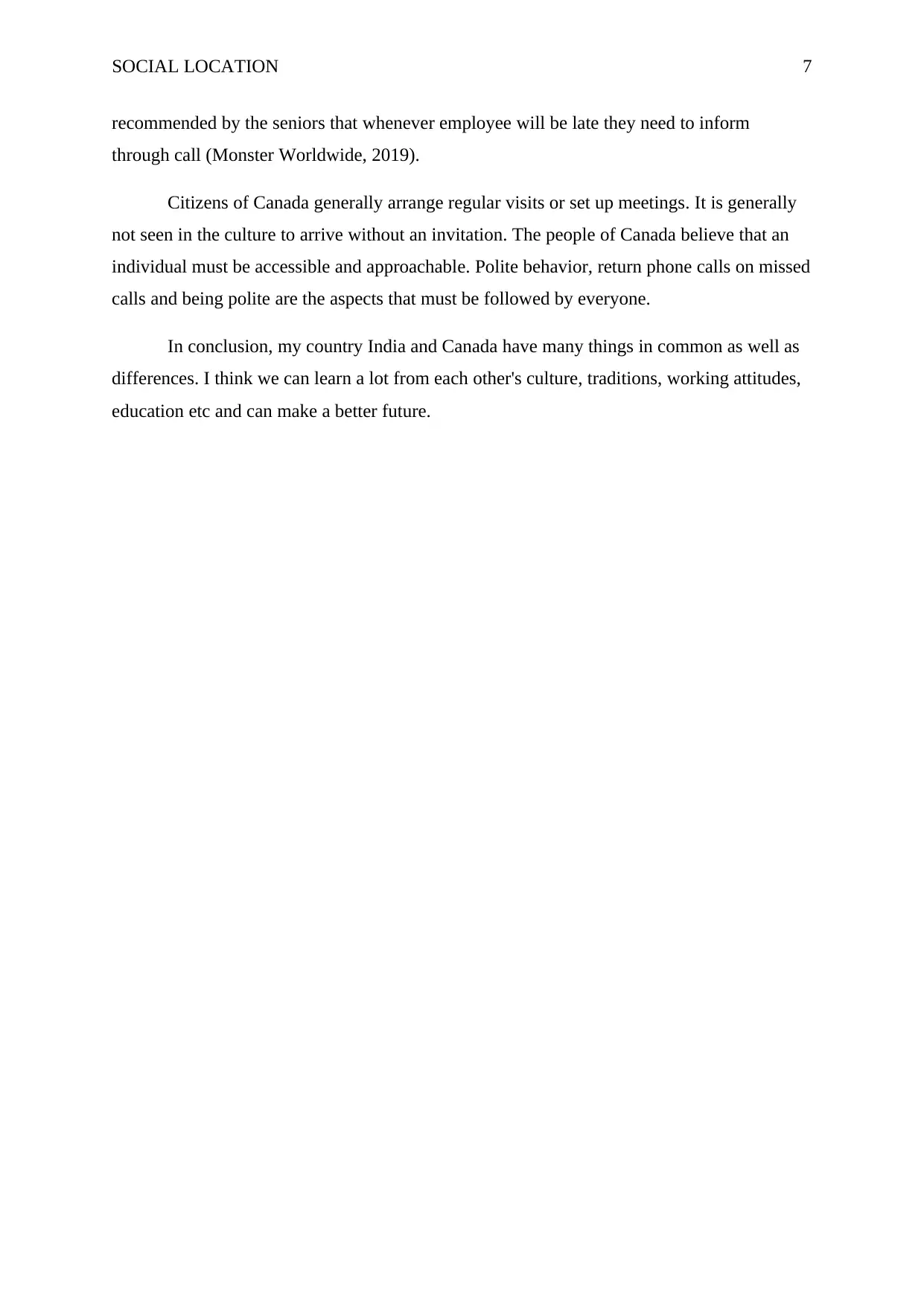
SOCIAL LOCATION 7
recommended by the seniors that whenever employee will be late they need to inform
through call (Monster Worldwide, 2019).
Citizens of Canada generally arrange regular visits or set up meetings. It is generally
not seen in the culture to arrive without an invitation. The people of Canada believe that an
individual must be accessible and approachable. Polite behavior, return phone calls on missed
calls and being polite are the aspects that must be followed by everyone.
In conclusion, my country India and Canada have many things in common as well as
differences. I think we can learn a lot from each other's culture, traditions, working attitudes,
education etc and can make a better future.
recommended by the seniors that whenever employee will be late they need to inform
through call (Monster Worldwide, 2019).
Citizens of Canada generally arrange regular visits or set up meetings. It is generally
not seen in the culture to arrive without an invitation. The people of Canada believe that an
individual must be accessible and approachable. Polite behavior, return phone calls on missed
calls and being polite are the aspects that must be followed by everyone.
In conclusion, my country India and Canada have many things in common as well as
differences. I think we can learn a lot from each other's culture, traditions, working attitudes,
education etc and can make a better future.
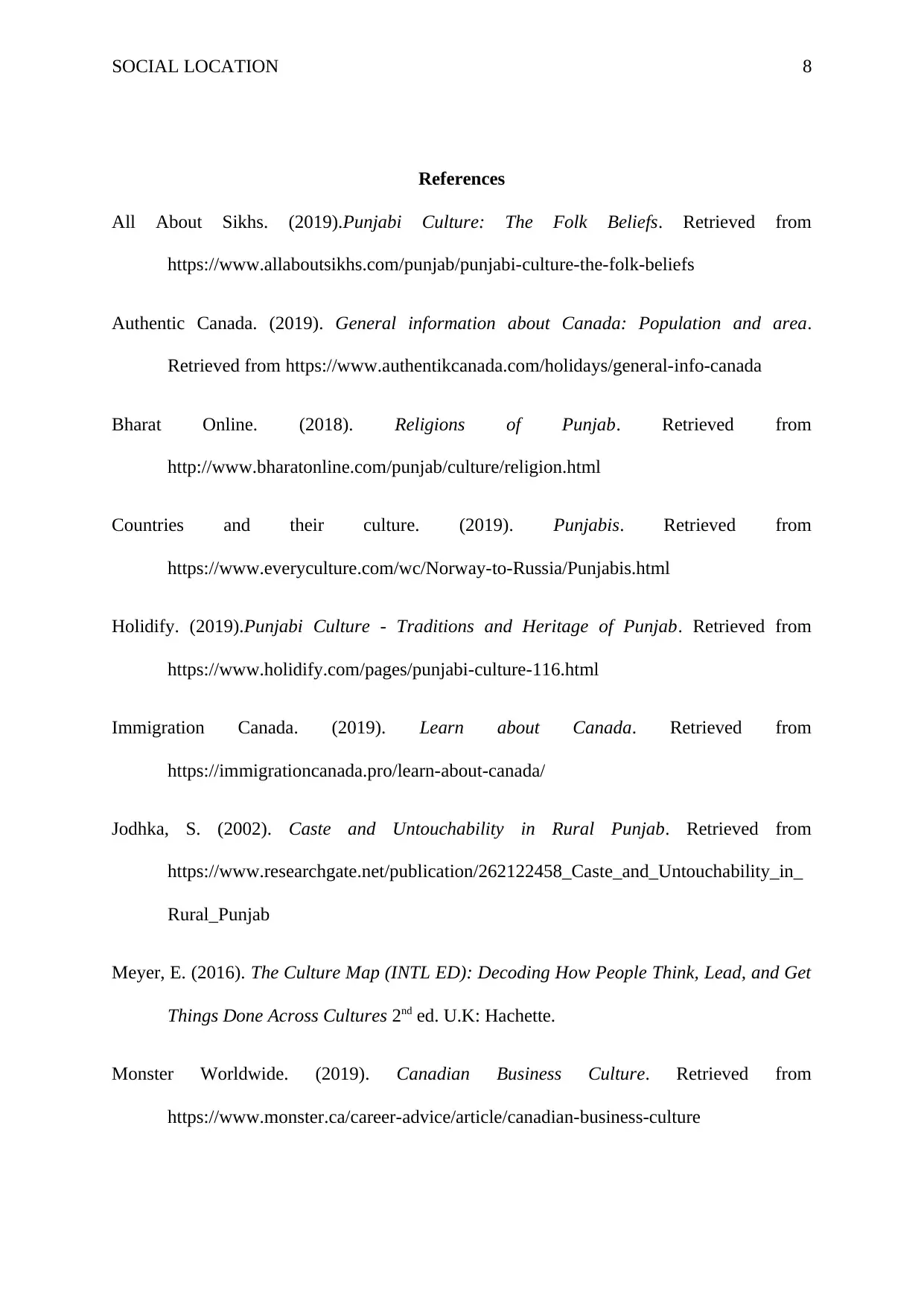
SOCIAL LOCATION 8
References
All About Sikhs. (2019).Punjabi Culture: The Folk Beliefs. Retrieved from
https://www.allaboutsikhs.com/punjab/punjabi-culture-the-folk-beliefs
Authentic Canada. (2019). General information about Canada: Population and area.
Retrieved from https://www.authentikcanada.com/holidays/general-info-canada
Bharat Online. (2018). Religions of Punjab. Retrieved from
http://www.bharatonline.com/punjab/culture/religion.html
Countries and their culture. (2019). Punjabis. Retrieved from
https://www.everyculture.com/wc/Norway-to-Russia/Punjabis.html
Holidify. (2019).Punjabi Culture - Traditions and Heritage of Punjab. Retrieved from
https://www.holidify.com/pages/punjabi-culture-116.html
Immigration Canada. (2019). Learn about Canada. Retrieved from
https://immigrationcanada.pro/learn-about-canada/
Jodhka, S. (2002). Caste and Untouchability in Rural Punjab. Retrieved from
https://www.researchgate.net/publication/262122458_Caste_and_Untouchability_in_
Rural_Punjab
Meyer, E. (2016). The Culture Map (INTL ED): Decoding How People Think, Lead, and Get
Things Done Across Cultures 2nd ed. U.K: Hachette.
Monster Worldwide. (2019). Canadian Business Culture. Retrieved from
https://www.monster.ca/career-advice/article/canadian-business-culture
References
All About Sikhs. (2019).Punjabi Culture: The Folk Beliefs. Retrieved from
https://www.allaboutsikhs.com/punjab/punjabi-culture-the-folk-beliefs
Authentic Canada. (2019). General information about Canada: Population and area.
Retrieved from https://www.authentikcanada.com/holidays/general-info-canada
Bharat Online. (2018). Religions of Punjab. Retrieved from
http://www.bharatonline.com/punjab/culture/religion.html
Countries and their culture. (2019). Punjabis. Retrieved from
https://www.everyculture.com/wc/Norway-to-Russia/Punjabis.html
Holidify. (2019).Punjabi Culture - Traditions and Heritage of Punjab. Retrieved from
https://www.holidify.com/pages/punjabi-culture-116.html
Immigration Canada. (2019). Learn about Canada. Retrieved from
https://immigrationcanada.pro/learn-about-canada/
Jodhka, S. (2002). Caste and Untouchability in Rural Punjab. Retrieved from
https://www.researchgate.net/publication/262122458_Caste_and_Untouchability_in_
Rural_Punjab
Meyer, E. (2016). The Culture Map (INTL ED): Decoding How People Think, Lead, and Get
Things Done Across Cultures 2nd ed. U.K: Hachette.
Monster Worldwide. (2019). Canadian Business Culture. Retrieved from
https://www.monster.ca/career-advice/article/canadian-business-culture
⊘ This is a preview!⊘
Do you want full access?
Subscribe today to unlock all pages.

Trusted by 1+ million students worldwide
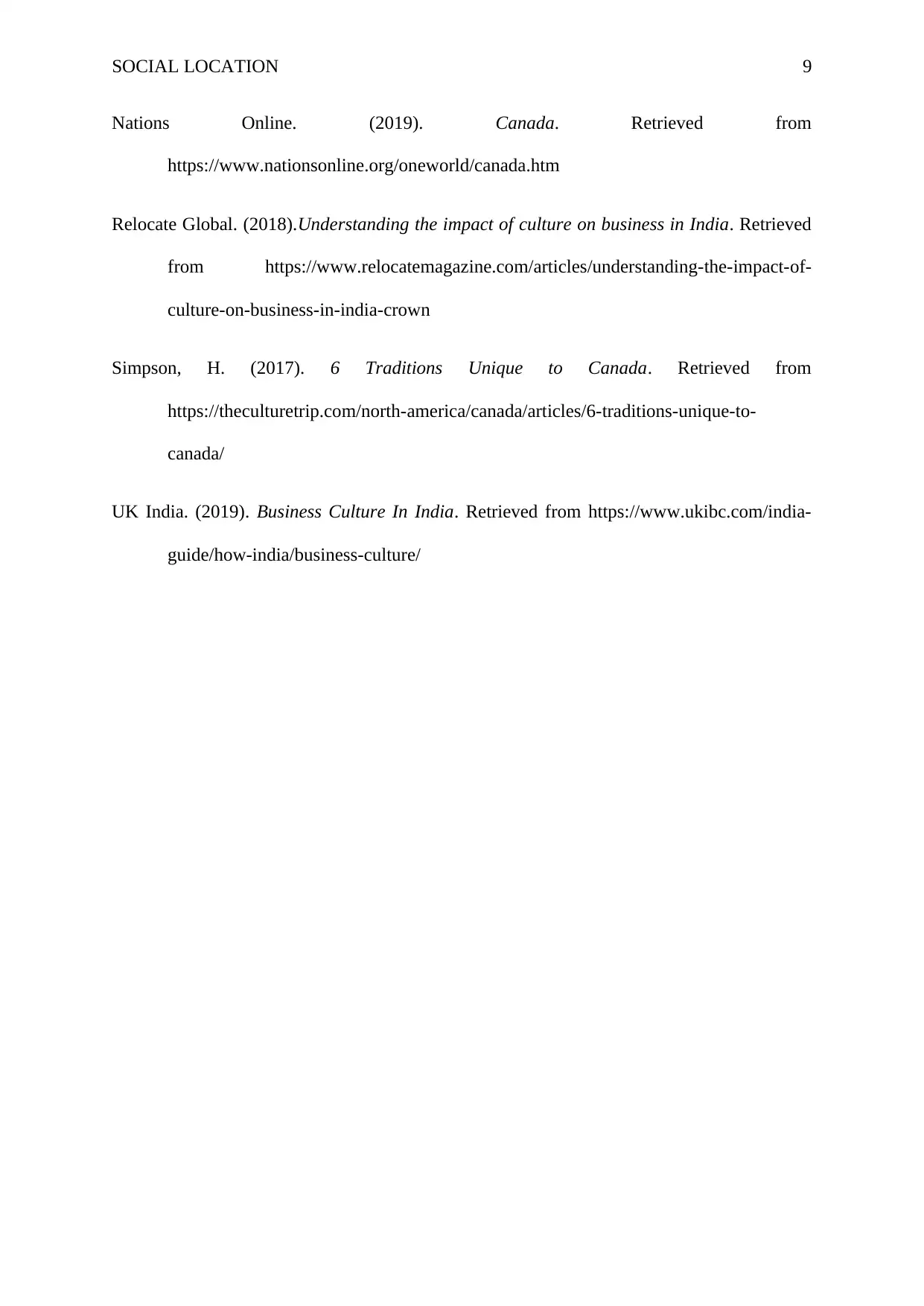
SOCIAL LOCATION 9
Nations Online. (2019). Canada. Retrieved from
https://www.nationsonline.org/oneworld/canada.htm
Relocate Global. (2018).Understanding the impact of culture on business in India. Retrieved
from https://www.relocatemagazine.com/articles/understanding-the-impact-of-
culture-on-business-in-india-crown
Simpson, H. (2017). 6 Traditions Unique to Canada. Retrieved from
https://theculturetrip.com/north-america/canada/articles/6-traditions-unique-to-
canada/
UK India. (2019). Business Culture In India. Retrieved from https://www.ukibc.com/india-
guide/how-india/business-culture/
Nations Online. (2019). Canada. Retrieved from
https://www.nationsonline.org/oneworld/canada.htm
Relocate Global. (2018).Understanding the impact of culture on business in India. Retrieved
from https://www.relocatemagazine.com/articles/understanding-the-impact-of-
culture-on-business-in-india-crown
Simpson, H. (2017). 6 Traditions Unique to Canada. Retrieved from
https://theculturetrip.com/north-america/canada/articles/6-traditions-unique-to-
canada/
UK India. (2019). Business Culture In India. Retrieved from https://www.ukibc.com/india-
guide/how-india/business-culture/
1 out of 10
Related Documents
Your All-in-One AI-Powered Toolkit for Academic Success.
+13062052269
info@desklib.com
Available 24*7 on WhatsApp / Email
![[object Object]](/_next/static/media/star-bottom.7253800d.svg)
Unlock your academic potential
Copyright © 2020–2025 A2Z Services. All Rights Reserved. Developed and managed by ZUCOL.





